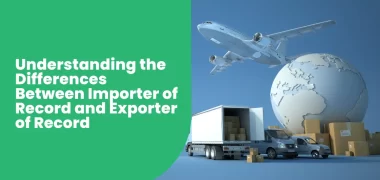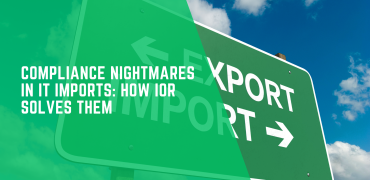In the world of international trade, ensuring that goods cross borders smoothly and legally is a complex process involving various entities and regulations. Two key roles in this process are the Importer of Record (IOR) and the Exporter of Record (EOR). While they may sound similar, the responsibilities and functions of these roles are distinct and crucial for compliance in global supply chains. This blog post delves into the differences between an Importer of Record and an Exporter of Record, exploring their unique roles, responsibilities, and significance in international trade.
Introduction to IOR and EOR
The concepts of Importer of Record (IOR) and Exporter of Record (EOR) are fundamental to international logistics and compliance. They define the entities responsible for ensuring that goods imported into or exported from a country meet all legal and regulatory requirements. Understanding these roles is essential for businesses involved in global trade to avoid penalties, delays, and legal issues.
What is an Importer of Record (IOR)?
The Importer of Record is the entity accountable for ensuring that imported goods comply with all local laws and regulations. This role encompasses a range of responsibilities, from customs clearance to payment of duties and maintaining accurate records. Here’s a closer look at what being an Importer of Record entails.
Definition and Role of IOR
The Importer of Record is the party responsible for:
- Ensuring Compliance: Ensuring that all imported goods meet the import regulations of the destination country.
- Customs Documentation: Handling all necessary documentation for customs clearance.
- Payment of Duties and Taxes: Paying any applicable duties, taxes, and fees.
- Record-Keeping: Maintaining detailed records of the import process for a specified period.
- Legal Accountability: Being legally accountable for the importation process.
The IOR can be an individual or a legal entity such as a company. They must be authorized to act as the IOR in the importing country, which often requires specific licenses or registrations.
Key Responsibilities of IOR
- Customs Compliance: The IOR must ensure that all customs declarations are accurate and complete. This includes providing detailed information about the goods being imported, their value, and their origin.
- Payment of Duties and Taxes: The IOR is responsible for calculating and paying any import duties, taxes, and fees. This is a critical function as incorrect payments can result in fines and delays.
- Regulatory Adherence: Imported goods must comply with the importing country’s regulations, including product standards, safety regulations, and any other legal requirements.
- Record-Keeping: The IOR must keep accurate records of all transactions and documentation related to the importation process. These records must be maintained for a period specified by local regulations.
- Logistics Coordination: Coordinating with logistics providers to ensure timely and compliant delivery of goods.
Importance of the IOR Role
The Importer of Record plays a vital role in international trade by ensuring that goods can enter a country legally and without unnecessary delays. By fulfilling all regulatory and financial obligations, the IOR helps businesses avoid legal penalties and maintain smooth operations.
What is an Exporter of Record (EOR)?
The Exporter of Record, on the other hand, is the entity responsible for ensuring that goods leaving a country comply with all local and international export regulations. The EOR’s responsibilities are crucial for the legal and efficient exportation of goods.
Definition and Role of EOR
The Exporter of Record is the party responsible for:
- Ensuring Export Compliance: Ensuring that all exported goods meet the export regulations of the origin country and any international laws.
- Export Documentation: Handling all necessary documentation for customs clearance and export licensing.
- Record-Keeping: Maintaining detailed records of the export process.
- Regulatory Adherence: Ensuring that goods comply with all relevant regulations, including those related to safety, quality, and security.
- Legal Accountability: Being legally accountable for the exportation process.
Like the IOR, the EOR can be an individual or a legal entity and must be authorized to act in this capacity.
Key Responsibilities of EOR
- Customs Compliance: Ensuring all export declarations are accurate and complete. This involves providing detailed information about the goods being exported, their value, and their destination.
- Export Licensing: Obtaining any necessary export licenses or permits required by the origin country or international bodies.
- Regulatory Adherence: Complying with all export regulations, including those related to dual-use goods, restricted items, and trade sanctions.
- Record-Keeping: Keeping detailed records of all export transactions and documentation. These records must be maintained for a period specified by local regulations.
- Logistics Coordination: Coordinating with logistics providers to ensure the timely and compliant shipment of goods to their destination.
Importance of the EOR Role
The Exporter of Record ensures that goods are exported legally and efficiently. By fulfilling all regulatory and documentation requirements, the EOR helps businesses avoid legal issues and ensures smooth cross-border transactions.
Key Differences Between Importer of Record and Exporter of Record
While both roles are crucial in international trade, their responsibilities and focus areas differ significantly. Here’s a detailed comparison of the key differences between an Importer of Record and an Exporter of Record.
Responsibilities
- IOR: Focuses on compliance and regulations within the importing country. Ensures that goods meet the import standards and that all duties and taxes are paid.
- EOR: Concentrates on compliance and regulations within the exporting country and international laws. Ensures that goods meet export standards and that necessary licenses are obtained.
Documentation
- IOR: Handles import declarations, duty payments, and compliance with local import regulations. Responsible for submitting documents like the bill of entry, commercial invoice, and packing list.
- EOR: Manages export declarations, export licensing, and adherence to international trade laws. Responsible for submitting documents like the export declaration, commercial invoice, and any necessary export licenses.
Regulatory Compliance
- IOR: Must ensure that imported goods comply with the standards and regulations of the importing country. This includes adhering to customs regulations, safety standards, and any product-specific requirements.
- EOR: Must ensure that exported goods comply with the standards and regulations of both the exporting country and international guidelines. This includes adhering to export control laws, trade sanctions, and security measures.
Financial Obligations
- IOR: Responsible for paying import duties, taxes, and fees. These costs are associated with bringing goods into the country.
- EOR: Responsible for any fees associated with obtaining export licenses and complying with export regulations. These costs are associated with sending goods out of the country.
Legal Accountability
- IOR: Legally accountable for the import process, ensuring all laws and regulations are followed to avoid penalties and fines.
- EOR: Legally accountable for the export process, ensuring compliance with all relevant export laws and regulations to avoid legal issues.
Why Understanding IOR and EOR Matters
For businesses engaged in international trade, understanding the distinct roles of Importer of Record and Exporter of Record is essential. These roles ensure that goods move across borders legally and efficiently, minimizing the risk of delays, fines, and legal issues.
Compliance and Risk Management
By clearly defining the IOR and EOR, businesses can better manage compliance and reduce risks. Each role has specific responsibilities that, if not fulfilled, can lead to significant penalties and disruptions in the supply chain.
Efficiency in Trade Operations
Understanding the differences between IOR and EOR helps streamline trade operations. Knowing who is responsible for what allows for better coordination and smoother transactions, ensuring that goods reach their destination on time and without unnecessary complications.
Legal and Financial Protection
Having clear roles and responsibilities protects businesses legally and financially. The IOR and EOR are accountable for their respective areas, ensuring that all legal and financial obligations are met. This accountability helps prevent legal disputes and financial losses.
Conclusion
In conclusion, the roles of Importer of Record and Exporter of Record are fundamental to the smooth functioning of international trade. While they share similarities in their overarching goal of ensuring compliance, their specific responsibilities and focus areas are distinct. The IOR ensures that goods entering a country comply with local regulations and that all import-related obligations are met. Conversely, the EOR ensures that goods leaving a country comply with export regulations and international laws.
Understanding these roles and their differences is crucial for businesses engaged in global trade. By clearly delineating the responsibilities of IOR and EOR, companies can navigate the complexities of international logistics more effectively, ensuring compliance and minimizing risks.




